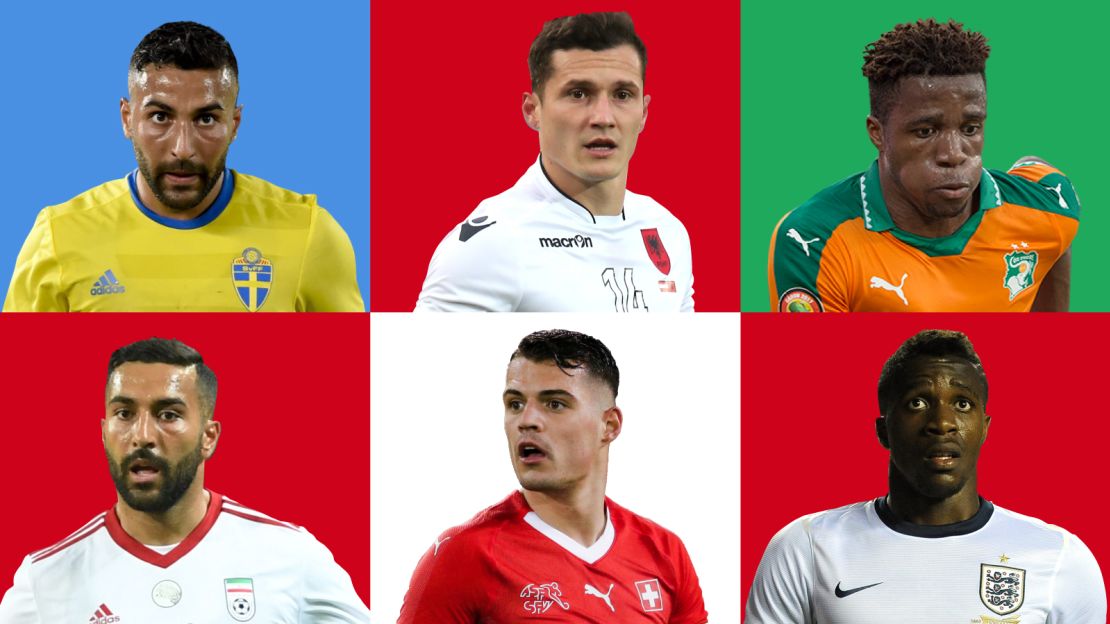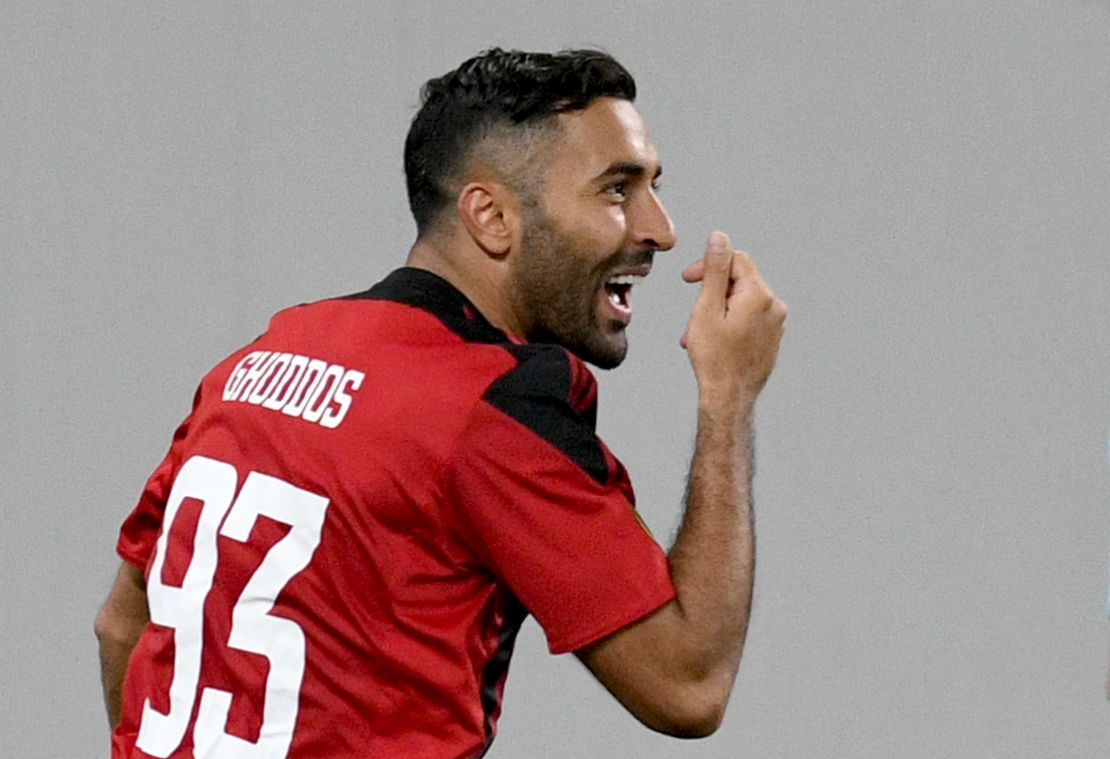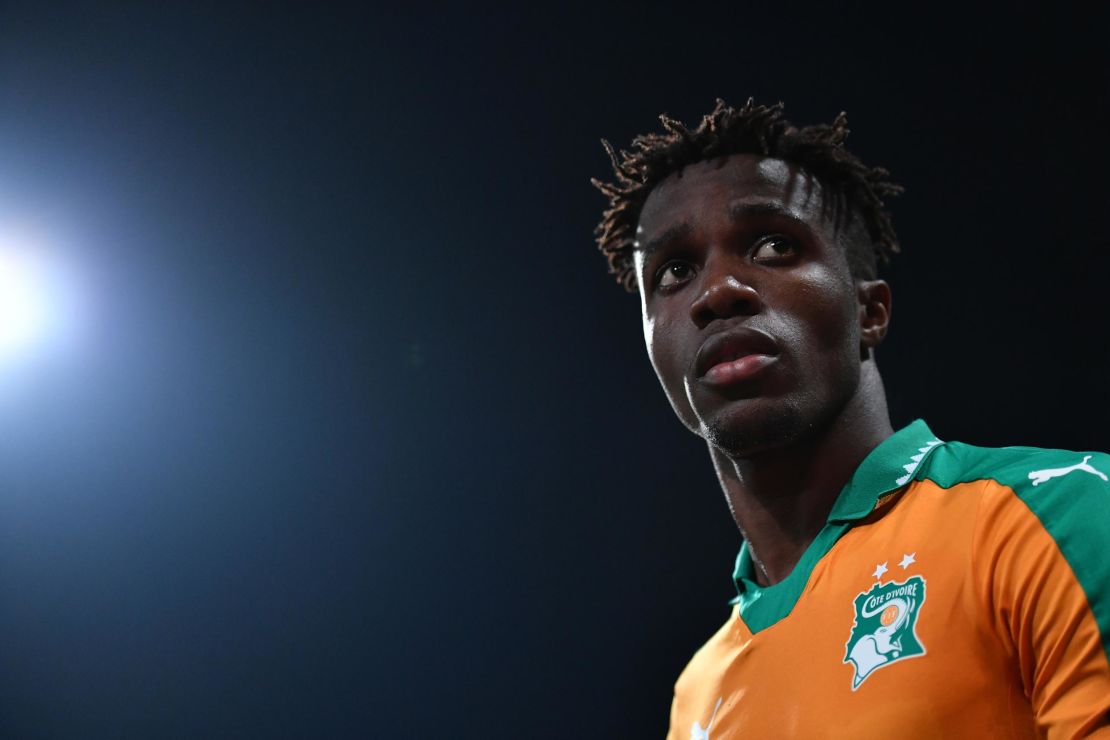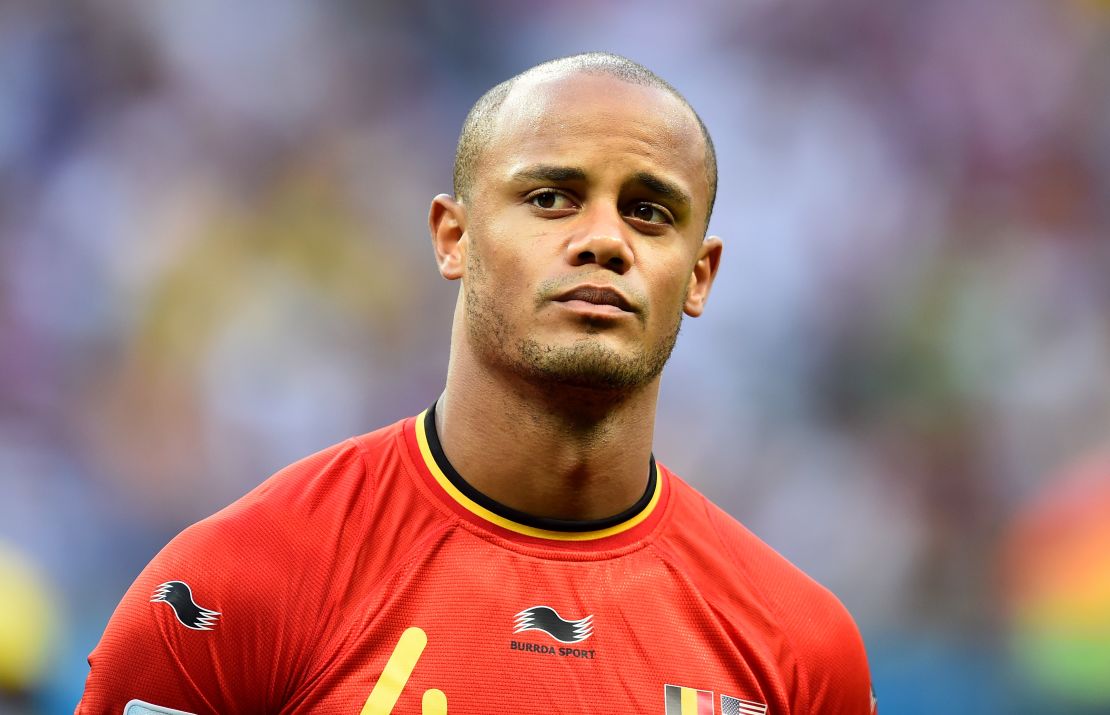Growing up in Malmö, budding footballer Saman Ghoddos had the flags of both Sweden and Iran on his bedroom wall.
He never anticipated he’d get a chance to play for both.
The forward’s journey from the lower ranks of Swedish football to this year’s World Cup has seen him twice pull on the yellow jersey of his birth country, only to later declare his allegiance to a nation he had never even visited.
It is unusual but not unique.

Former FIFA President Sepp Blatter once warned of the threat of naturalized Brazilian “invaders” populating the teams of other countries. In recent years strikers Diego Costa and Eduardo have controversially represented Spain and Croatia after earning dual nationalities.
Xherdan Shaqiri, scorer of one of the goals of Euro 2016, has previously stitched the flags of Switzerland, Albania and Kosovo onto his boots. Then there’s Bundesliga star Leon Bailey, the Jamaican who isn’t sure if he wants to play for Jamaica. Several sets of brothers, from the Xhakas to the Boatengs to the Berishas, are divided by duty to different nations.
“The world is changing, immigration is changing,” said FIFA Vice President Victor Montagliani in late 2017.
“There are nationality issues that pop up all over the world … so it’s a good time to have a look at this and see if there are solutions, without hurting the integrity of the game.”
As countries become increasingly cosmopolitan so, in general, do their football teams.
Of the 32 sides at Russia 2018, over 9% of players were born outside of the country they represented in qualifying. When Iran face Morocco in Group B’s opening fixture, the latter’s starting eleven could be made up entirely of European-born players.
Two decades on from the exploits of France’s “Rainbow Team” – when a side comprised of players from all over the francophone world united a divided country – the notion of nationality in modern football is as divisive and complex as ever …
Ghoddos - ‘Representing both Sweden and Iran’
Ghoddos, star of Östersunds FK’s fairy-tale rise from Swedish obscurity to the Europa League knockout stages, was born and raised in the Scandinavian nation. A life beside the Baltic Sea is all he has ever known.
“I had both the Swedish flag and the Iranian flag on my bedroom wall actually when I was a child,” Ghoddos tells CNN Sport. “Of course, I didn’t really think about what country I would play for; it was more a case of finding a club.”
It was naturally a dream come true when Sweden manager Janne Andersson came calling in early 2017, giving Ghoddos his first taste of international football in friendlies against the Ivory Coast and Slovakia.

Technically proficient with an eye for goal, Ghoddos scored with his first shot on target, maintaining that form as he directly contributed to goals against Galatasary, PAOK, Athletic Bilbao, Zorya and even Arsenal during his club’s European adventure.
“The stronger the team we were playing against, the easier it was for me to compete at their level,” says Ghoddos, who hopes to play for “one of the bigger teams in Germany, England, Spain or Italy” a year from now.
Suddenly he was attracting envious glances from elsewhere. Former Arsenal manager Arsene Wenger called him a “marvelous player both technically and tactically,” with a host of English Premier League sides including West Ham and Leicester reportedly sending scouts.
They weren’t the only ones.
Ghoddos’s parents hail from the Southwestern Iranian city of Ahvaz – a fact not lost on Iran boss Carlos Queiroz.
The talented Swede, after all, hadn’t yet played a competitive international. He was still eligible to switch allegiances to Iran, despite having never visited the country.
“Queiroz said he was really interested in me and he really liked my football and how I’m playing,” says Ghoddos, recalling their initial telephone conversation in June 2017. “He said that I would be a good asset for the team.”
Suddenly the player was forced to arrive at a decision he never thought he’d have to make. Did he consider himself Swedish or Iranian?
“It’s a really hard question because it’s deeper than that,” says Ghoddos, who admitted at the time his loyalties were split “50:50.”
“I love both countries, and believe I can represent both,” he adds.
READ: A day in the life of the ‘Egyptian King’
After administrative delays from FIFA – during which Sweden made a late attempt to change his mind – Iran, a nation with a solitary World Cup victory in its history, won the race for his permanent allegiance.
“They gave me the most interest. I don’t know how to explain it, it was only Iran first,” says Ghoddos. “They said: ‘You should come here and play in the playoffs for the World Cup,’ and I didn’t hear anything from Sweden. As soon as I picked Iran, it was then that Sweden came.”
It was a case of only realizing what you have when it’s gone for Andersson, who admitted the Swedish football association had “obviously hoped for a different decision.”
As for Ghoddos, the striker is now set to pull on the white jersey of Iran at the Russia 2018 World Cup after being named in Querioz’s 32-man initial squad – something he says is beyond his “biggest dreams.”
“Of course it’s really big for me, and for my family,” says the 24-year-old. “I can’t imagine how proud they are of me. So I will play for them and for me too.”
Having submitted a “written, substantiated request” to FIFA, Ghoddos visited Iran for the first time in September 2017 to join up with the national side after receiving his new passport from the embassy.
His new teammates welcomed him with open arms, assuring him he had made a “good decision,” and he has since played for Team Melli on seven occasions, finding the net against Panama.
With World Cup group stage fixtures against Portugal, Morocco and Spain to come, it’s not going to be easy but Ghoddos is confident Iran can spring a surprise.
“Of course I think that! I have to think like that,” he enthuses. “It’s like when Östersunds played in the Europa League: every game people expected us to lose but instead we were thinking within the team ‘we can make it,’ believing in ourselves.
“It’s the same thing with Iran. The World Cup, we have to just believe in ourselves. I think it’s a good team with really good players, so anything can happen. We will just believe in ourselves that it’s possible to win all of the games.”
Off the pitch, the two cultures are markedly different; as it stands, Iranian women are still not allowed to enter football stadiums. But Ghoddos has no regrets.
“I love both countries so it was really special for me the first time pulling on the Sweden shirt, and it was the same thing when I put the Iran shirt on,” he says. “It was really an honor for me that I could represent both countries.
“It will be a good chance to show what I can do, of course, but that’s not why I’m playing for Iran. I play for my heart and for the flag. That’s the feeling you get when you play for a national team.”
It’s not that likely to come to pass, but should Iran and Sweden face each other at the World Cup, what would be running through his mind in the tunnel?
“Oh, my adrenaline would be so high,” laughs Ghoddos. “It’s crazy, but I would love to play that game …”
Wilfried Zaha – ‘No regret at all’

Another player with no regrets is Premier League star Wilfried Zaha, though the Crystal Palace forward won’t be going to the World Cup.
Born in Ivorian city of Abidjan, Zaha moved to Thornton Heath in 1997 at age four with his eight siblings, honing his extravagant skills in the parks of Greater London.
While still a Championship player in 2012, Zaha admitted his loyalties were equally split, saying: “I was born in Ivory Coast but all I know is England; when the time comes, I’ll make a choice.”
That choice initially appeared to be England, with Zaha representing the Under-19s, U-21s and finally England’s senior side in two friendlies.
But in November 2016, after four years without a cap, at the age of 24 and in the form of his career, Zaha opted for his country of birth.
He was pilloried in the English media for a lack of patience, fight and desire, with former defender Danny Mills suggesting he had taken the “easy option” and manager Gareth Southgate questioning the player’s “inherent desire.”
Zaha, though, just wanted to feel appreciated.
“It was just like I was rejected from the England side,” he tells CNN Sport, having been named in the Team of the Season at the recent Best of Africa awards. “I didn’t get picked or even get a look in for four years.
“Four years in football is a long time so it’s like there’s no regret at all. No one even thought about me at all. And Ivory Coast, even though I told them no, they still had the belief in me and still wanted me because they knew what I could do for the team.”
In the wake of Southgate’s comments, Zaha’s representatives issued a statement asserting it was his “personal choice and right as a senior player to accept the opportunity to represent his nation of birth and that of his family heritage.”
It went on to add: “His ‘desire’ or ‘passion’ should never have been publicly questioned for making that decision.”
Zaha had been personally urged to represent the Elephants by none other than Didier Drogba and openly relishes the fact that he left Ivory Coast as a “nobody” and returned as a “hero.”
“Obviously we may not be in the World Cup but it’s just a learning curve,” says the winger. “From there, what we need to do is just get better and hopefully try and get into the next one.
“As for me not playing for England, I’ve got no regret at all. I’m happy with the decision I made.”
Don’t think he won’t still be supporting Southgate’s men at Russia 2018, though.
“Yeah, why not?!” exclaims Zaha. “I live here, I’ve lived here since I was four, so why not support them. I’ve got a lot of friends in the team so yeah I wish them the best.”
Vincent Kompany - ’100% Belgian, 100% Congolese’

While the depth of talent in Belgium’s national team is currently the envy of Europe, not everyone is aware of the cultural and linguistic divides in both the country and the team – where some speak French, others converse in Flemish, and not all players are capable of understanding both.
Able to speak fluently in five languages, Vincent Kompany — a second-generation immigrant — has emerged as a leader and unifying force for both club and country. On Monday he was named in Belgium’s 23-man World Cup squad despite picking up an injury in a friendly against Portugal on June 2.
The Manchester City defender, born to a Congolese father and Belgian mother in Brussels, believes it’s a privilege to be able represent more than one nation at a time.
“I represent my heritage. I feel 100% Belgian and 100% Congolese,” Kompany tells CNN, having previously helped build a village in the Congolese capital of Kinshasa. “I’m proud of that. It’s a wealth on my side to be able to do that.”
“I’ll try to do well with Belgium and if I do, I hope that a lot of people in Congo as well will feel proud of my achievements.”
A decade has passed since Kompany joined City from Hamburg for an undisclosed fee believed to be around £7.5 million ($10 million).
Big-money stars have been and gone, five managers have walked the touchline, but Kompany has been a constant rock.
“There’s a lot of people in Manchester that feel associated with Belgium when me and Kevin [de Brunye] walk out, you know?” he says, illustrating the potential fluidity of national sentiment. “There’s nothing wrong with that.”
The club captain’s wife is a Mancunian, he celebrated the recent title win in a local pub and perhaps there’s even a hint of a Manchester accent creeping in.
Is there a part of him, however small, that’s starting to feel English?
“I start sounding more and more like an English guy!” he laughs. “Look, my kids are English so I have no problem. I like the country, I like the culture, I like how I’ve been received here.
“But to say I’m English, I can’t quite get the words out yet. But I feel Manc, yeah!”
CNN’s Amanda Davies and Sandy Thin contributed to this feature.




